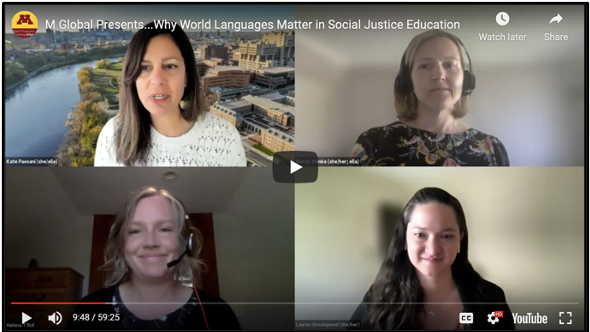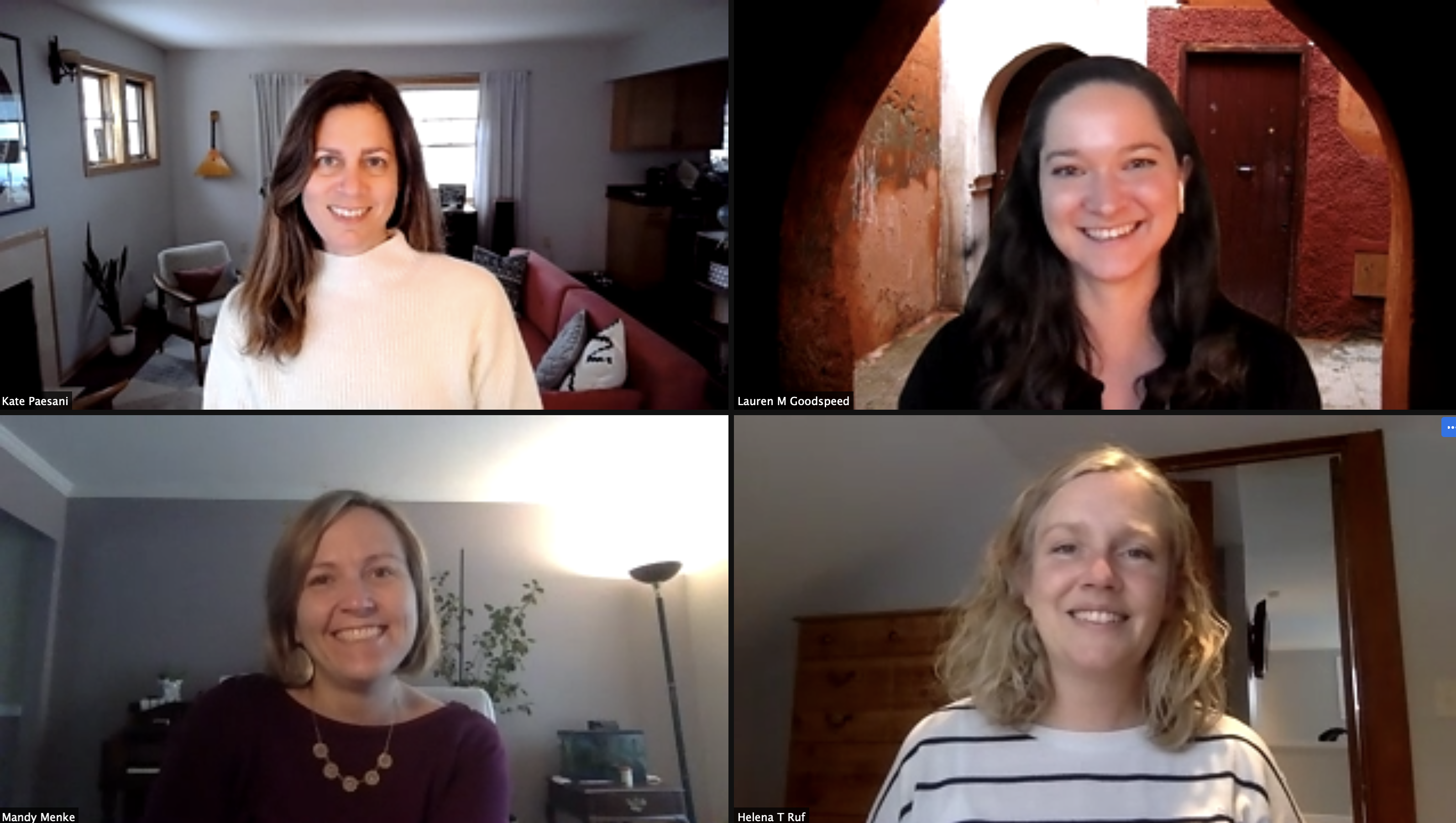Initiative Background
 Topics of social justice resonate with students across the globe, regardless of their area of study. This is particularly true for language learners, who seek not only to build linguistic proficiency, but also to understand the cultural products, practices, and perspectives of the languages they are studying. CARLA’s Social Justice in Language Education initiative builds on this reality through its focus on social justice topics across cultures and languages. You can learn more about the initiative’s rationale through the recording of a webinar titled Why World Languages Matter in Social Justice Education.
Topics of social justice resonate with students across the globe, regardless of their area of study. This is particularly true for language learners, who seek not only to build linguistic proficiency, but also to understand the cultural products, practices, and perspectives of the languages they are studying. CARLA’s Social Justice in Language Education initiative builds on this reality through its focus on social justice topics across cultures and languages. You can learn more about the initiative’s rationale through the recording of a webinar titled Why World Languages Matter in Social Justice Education.
Consistent with CARLA’s work grounded in praxis, or the relationships between research and practice, the initiative integrates theoretical principles from two critical pedagogies:
- multiliteracies pedagogy (Cope & Kalantzis, 2009, 2015; New London Group, 1996)
- social justice pedagogy (Glynn, Wesely, & Wassell, 2018; Hackman, 2005)
These frameworks inform curriculum and instruction that equip students with the skills and knowledge needed to:
- critically engage with target language texts;
- identify and evaluate linguistic and cultural differences across societies;
- challenge and disrupt misconceptions related to social justice topics; and
- participate fully in personal, academic, professional, and civic life.
The research and materials that form the Social Justice in Language Education initiative reflect these frameworks and support language teachers in their efforts to more fully integrate target language texts and social justice topics into their courses; to critically engage students with those texts through instructional practices; and to prioritize equity, diversity, inclusion, and access in language education.
This initiative began in 2020 and has been funded by two grants from Title VI of the U.S. Department of Education. A grant from the International Research and Studies Program (2020-2023) supported a project called Social SCILS—Social Justice in Language Education: Strengthening Career Competencies, Intercultural Understanding, and Language Proficiency through Specialized Materials. The Social SCILS project was expanded and renamed Social Justice in Language Education in 2022 when CARLA received funding through the Language Resource Centers Program (2022-2026). These grants support the creation of the following professional development activities and teaching resources:
- templates for creating social justice curricular units, assessments, and lesson plans;
- curricular units in multiple languages;
- a social justice bibliography of scholarly and practical resources;
- a searchable database of target language texts;
- webinar recordings;
- workshops and an associated professional learning community; and
- a podcast series.
Many of these materials are published as open educational resources (OERs) to enable teachers to use, adapt, and reshare them to fit their specific needs.
In addition to creating these materials, the Social Justice in Language Education initiative leaders are also conducting two research studies:
- To address the initiative’s impact on teachers, the team is investigating how postsecondary language educators understand and enact social justice in language education and how this understanding and enactment connects to teachers’ identity construction.
- To address the initiative’s impact on learners, the team is investigating postsecondary students’ language use and social justice takeaways as they experience social justice-oriented curricular units.
Initiative Team
The initiative leaders include four language educators from the University of Minnesota:
 Kate Paesani, CARLA
Kate Paesani, CARLA- Project Director
- Lauren Goodspeed, Department of French & Italian
- Language-Specific Coordinator (Arabic, French, Chinese)
- Mandy Menke, Department of Spanish & Portuguese Studies
- Language-Specific Coordinator (Portuguese, Spanish, Turkish)
- Helena Ruf, Department of German, Nordic, Slavic & Dutch
- Language-Specific Coordinator (Dutch, German, Russian)
Eleven curriculum developers from various universities created the curricular units for the initiative:
- Stephanie Anderson, University of Minnesota (Portuguese)
- Nadya Clayton, University of Minnesota (Russian)
- Sara Finney, University of Minnesota (Spanish)
- Ashlie Henery, University of Minnesota (French)
- Beth Kautz, University of Minnesota (German)
- Ilknur Lider, University of Pittsburgh (Turkish)
- Sara Mack, University of Minnesota (Spanish)
- Jenneke Oosterhoff, University of Minnesota (Dutch)
- Ginny Steinhagen, University of Minnesota (German)
- Katrien Vanpee, University of Minnesota (Arabic)
- Andie Wang, Colby College (Chinese)
The following consultants ensured the integrity of the project:
- Cassandra Glynn, Concordia College (Social Justice Consultant)
- Sara Mack, University of Minnesota (Career Readiness Consultant)
- JD Walker, University of Minnesota (Grant Evaluator)
- Beth Wassell, Rowan University (Social Justice Consultant)
Finally, both the materials development and research projects were supported by the following students from the University of Minnesota:
- Heidi Beckman (Graduate Research Assistant, Summer 2021)
- Yoko Hama (Graduate Research Assistant, 2022-2023)
- Marie Mangold (Graduate Research Assistant, Summer 2022)
- Zayda Thalacker (Dean’s First-Year Research & Creative Scholar, Spring 2022)
- Lucia Morelos Quintero (Dean’s First-Year Research & Creative Scholar, Spring 2022)
References
Cope, B., & Kalantzis, M. (2009). ‘Multiliteracies’: New literacies, new learning. Pedagogies: An International Journal, 4(3), 164-195.
Cope, B., & Kalantzis, M. (2015). The things you do to know: An introduction to the pedagogy of multiliteracies. In B. Cope & M. Kalantzis (Eds.), A pedagogy of multiliteracies: Learning by design (pp. 1-36). Palgrave Macmillan.
Glynn, C., Wesely, P., & Wassell, B. (2018). Words and actions: Teaching languages through the lens of social justice (2nd ed.). American Council on the Teaching of Foreign Languages.
Hackman, H. W. (2005). Five essential components for social justice education. Equity & Excellence in Education, 38, 103-109
New London Group. (1996). A pedagogy of multilitercies: Designing social futures. Harvard Educational Review, 66(1), 60-92.
